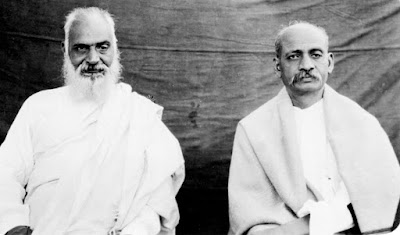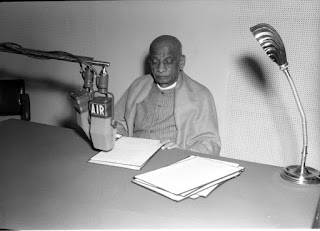सरदार वल्लभभाई पटेल - आज के युग का एकलव्य
सरदार पटेल को आज के युग का एकलव्य कह सकते है। यह मै इस वजह से कह्ना चाहता हूँ क्योकि एकलव्य ने गुरुभक्ति के लिये गुरुदक्षिणा के रूप मे अपना अंगुठा काटके गुरुके चरणो मे अर्पण कर दिया। सरदार पटेलने गांधीजीको अपने गुरु के रूपमे स्वीकार किया था । सरदार पटेलने देशभक्ति, गुरुभक्ति और राष्ट्रप्रेम को सदा अग्रेसर रखा और गांधीजीके कहने पर हंसते हंसते कोंग्रेस प्रेसीडंट के पदके चुनाव से अपना नाम वापस ले लिया ।
मेरे जैसे कई लोगोका यह मानना है कि सरदार पटेल के साथ अन्याय हुआ है और वह प्रधानमंत्री पद के लायक थे और वे कोंग्रेस प्रेसिडंट का चुनाव जीत भी गये थे फिर भी उन्हे प्रधानमंत्री नही बनाया गया और उनसे चुनावमे से अपना नाम वापस लेने के लिये गांधीजीने कहा। उन सब से मेरा एक सवाल है -- क्या सरदार पटेल अन्याय को सहन करने वाले व्यक्तिओमे से एक थे? उन्होने तो सदा गांधीजीकी बात का समर्थन ही किया है, कभी भी उनकी बात अनदेखा नही किया। उन्हे कभी भी ऐसा लगे कि गांधीजी की कोई बात गलत है तो वह गांधीजी के साथ विचार विमर्श कर लेते थे लेकिन करते वही थे जो गांधीजीने कहा होगा, और हमेशा गांधीजी के निर्णय के अनुसार कार्य किये है। अगर उनको ऐसा लगा होता कि उनको प्रधानमंत्री न बनाके गांधीजीने उनके साथ अन्याय किया है तो उन्होने कभी न कभी इस बात का झिक्र तो गांधीजी को किया होता लेकिन ऐसी कोई बात सामने आज तक न सुनी न पढी गई। ईस बात को अगर गुरुभक्ति या गुरुदक्षिणा के रूप मे देखा जाए तो गलत नही होगा। सरदार पटेल आज कल के नेताओ जैसे नही थे कि अपनी राजहठ को मनाने के लिए अलग पक्ष कि रचना करे या फिर विरोध प्रदर्शन करे। सरदार पटेल अगर देश के प्रधान मंत्री बने होते तो आज देशके हालात अलग होते लेकिन उस वक्त कि परिस्थिति और देश के हालात ऐसे थे कि देश गुलामीमे से बहार निकलने की खुशी मनाए या फिर बंटवारे का दु:ख मनाए, सरदार पटेल को कभी कोई पद की लालच नही थी, बल्कि उनका तो यह मानना था कि देशसेवा के लिए कोई पद की जरूरत नही हे, बिना पदके भी देश के लिए काम किया जा सकता है। एक बात से मैं खुद सहमत हुं कि यह अन्याय तो देश के साथ हुआ है, अगर सरदार पटेल देश के पहले प्रधानमंत्री होते तो देश आजादीके बाद जिन परिस्थितिओ मे से गुजरा वह परिस्थिति नही होती, लेकिन इस प्रकारके अन्याय से ज्यादा आज कल के नेता सरदार पटेल के नाम को अपनी राजकीय परीस्थिति को सुधारने के लिए करते है यह सबसे बडा जानबुझ के किया हुआ अन्याय है । उन्होने उप-प्रधानमंत्री और ग्रुह मंत्री का पद सम्भालते हुए देश के सामने आनेवाली हर चुनोती का सामना बखुबी किआ। उनका सदैव यही मानना था कि अपने घरकी मुसीबतो के हल के लिए घर के बाहर से मदद कभी नही लेनी चाहिए । मुसीबत अपने घर की है तो उसका सामनाभी घरके सदस्य मिल के करेंगे। और ऐसा उन्होने साबित करके भी दिखाया। चाहे वह जुनागढ की बात हो या फिर हैद्राबादकी बात हो । करीब करीब कश्मीर की समस्या भी सुलझने वाली थी लेकिन जवाहरलाल नहेरूने युनाईटेड नेशन को देश की कश्मीर की समस्या सुलझाने के लिए आमंत्रित किया । और आज यह भूल हमपे भारी पड रही है ।
सरदार वल्लभभाई पटेल जिस प्रकार शौर्य के प्रतीक थे उसी प्रकार चातुर्य के धनी थे । स्वतंत्रता संग्रामके महारथी थे, और स्वराज्य के सुत्र संचालनके कुशल सारथी थे । भारतमें परिवर्तन की राजनीति तेजी से दिखलाई दे रही थी, उसके पीछे ब्रिटिश प्रधानमंत्री एटली का भी बहुत बडा हाथ था । उन्होने चुनावो के समय ही अपने दल की एक नीति कि घोषित की थी कि वे सत्तारुढ होतेही भारतको पुर्ण स्वतंत्रता देने की नीति अपनाएंगे । उन्ही उद्देश्योको लेकर लार्ड वावेलने २१ अगस्त १९४५ की ब्रिटिश सरकारने भारतमें अंतरिम सरकार का गठन करने के लिए केंद्रिय तथा प्रांतीय धारासभा के चुनावो की घोषणा भी कर दी । उस समय कोंग्रेसने पार्लियामेंट्री बोर्ड का अध्यक्ष सरदार को ही बनाया था । ईस बार सरदार जेल से छुटने के बाद अस्वस्थ थे और गांधीजी के साथ पूना के पास उरुलीकांचन में थे, लेकिन कोंग्रेस ने पुन: उनके उपर ही चुनावों का बहुत बडा दायित्व सौंप दिया । यहां तक कि सभी उम्मीदवारों को चुनाव लडने के लिए फंड की व्यवस्था भी उनके उपर ही पडी । सरदार पटेल दिर्घ द्रष्टा थे उन्होने अनुमान लगा लिया था कि मुस्लिम लीग के कारण कठिनाईयां बहुत है, लेकिन फिर भी इसके लिए जी-जान लगा दी । किसी उम्मीदवार को किसी प्रकार का अभाव नही होने दिया । टिकटो के बंटवारे से लेकर वित्तीय सहायता का भार भी उन्होने ढोया और कोंग्रेस विजयी रही । सरदार ने चुनावो के दौरान देश की जनताको यह विश्वास दिलाया था कि – “अब जहाज किनारे पर पहुच गया है । और भारतकी आजादी निकट आ गई है ।“
सरदार पटेल को चाणक्य कहा जाता था, इसीलिए कि उन्होने पहले ही अपना यह निर्णय कह दिया था कि वर्तमान स्थिति मे संविधान परिषद की बेठक में बिना किसी छिपाव-दुराव के कहा “मैने विभाजन को अंतिम उपाय के रूपमें तब स्वीकार किया था, जब सम्पुर्ण भारत हमारे हाथ से निकल जाने का खतरा पैदा हो गया था । मुस्लिम लीग के पांच सदस्य देश का बंटवारा करने की मंशा के साथ ही अंतरिम सरकार मे संम्मिलित हुए थे ।“
सरदार वल्लभभाई पटेल स्वतंत्रता के साथ देश के पहले गृहमंत्री बने, और उन्होने अपने कुछ ही दिनो के तजुर्बे से यह समझ लिया था कि जितनी समस्याए हैं, उन्हे सुलझाने के लिए अनुभवी अधिकारियों की सख्त जरूरत है । उन्होने तीन श्रेणियां बनाई – एक वे जो पाकिस्तान जाना चाहते हो, वे पाकिस्तान चले जाए । दुसरे वे जो सेवा में नही रहना चाहते हो वे सेवा से निव्रुत हो जाए और तीसरे वे जो सेवा में रहना चाहते हो, वे अब अपनी कार्य पध्धति को सुधारे और अपने को जनता का सेवक माने । उन्होने साफ शब्दोमें कहा कि हम लोगों को संघर्ष और आंदोलन का तजुर्बा है लेकिन शासन का अनुभव नही है । इसलिए आप यदि अपना पूर्ण समर्थन और विश्वास दे, तो हम भी आपको विश्वास में लेने को तैयार है । और इसका नतीजा यह आया कि अधिकांश भारतीय अधिकारियोंने सरकार की सेवा जारी रखी । सरदार पटेल ने ऐसे समय सबसे बडा प्रतिमान देशभक्ति और राष्ट्रियता का रखा । जहां नऐ लोगो की नियुक्ति की आवश्यकता थी वह भी किया । के. पी. एस. मेनन और वी. शंकर जैसे वरिष्ठ आई. सी. एस अधिकारियो को उन्होने पूर्ण विश्वास में लिया तथा देशी राज्यो के विलय मे उनसे जवाबदेही के काम लिए ।
३० जनवरी १९४८ को सरदार पटेल ने गांधीजी को अंतिम मुलाकात में यह निवेदन किया था – “बापु, मुझे मंत्रीमंडल से अलग होने की अनुमति दीजिए, क्योंकि मौलाना आजाद सद्रश कई ऐसे व्यक्ति है, जो मुझे और जवाहरलाल को एक देखना नही चाहते । वह हम दोनो में मनोमालिन्य पैदा करना चाहते हैं, ताकि मेरी अनुपस्थिति में “जी हजुरी/’ करके मनमानी कर सके और मंत्री मंडल में प्रभाव बढा सकें । गांधीजी की इस संबंध में एक ही राय थी कि सरदार पटेल और पंडित नेहरू दोनोमें किसी प्रकार का वैमनस्य न हो । दोनो एक रहे इसीमें राष्ट्र की भलाई है ।
आखिर मै मुझे कवि दिनकर की पंक्तियां सहसा याद आ रही है –
“बडा वह आदमी जो जिंदगी भर काम करता है, बडी वह रूह जो रोए बिना तन से निकलती है “
सरदार वल्लभभाई पटेल के बारे में ये पंक्तिया सटीक बैठती है । उन्होने अपनी आखरी सांस तक काम करते रहे है, वे कर्म मे विश्वास रखने वाले योद्धा थे ।
रशेश नरेंद्रभाई पटेल - करमसद
रशेश नरेंद्रभाई पटेल - करमसद


























 Follow the Sardar Patel channel on WhatsApp
Follow the Sardar Patel channel on WhatsApp